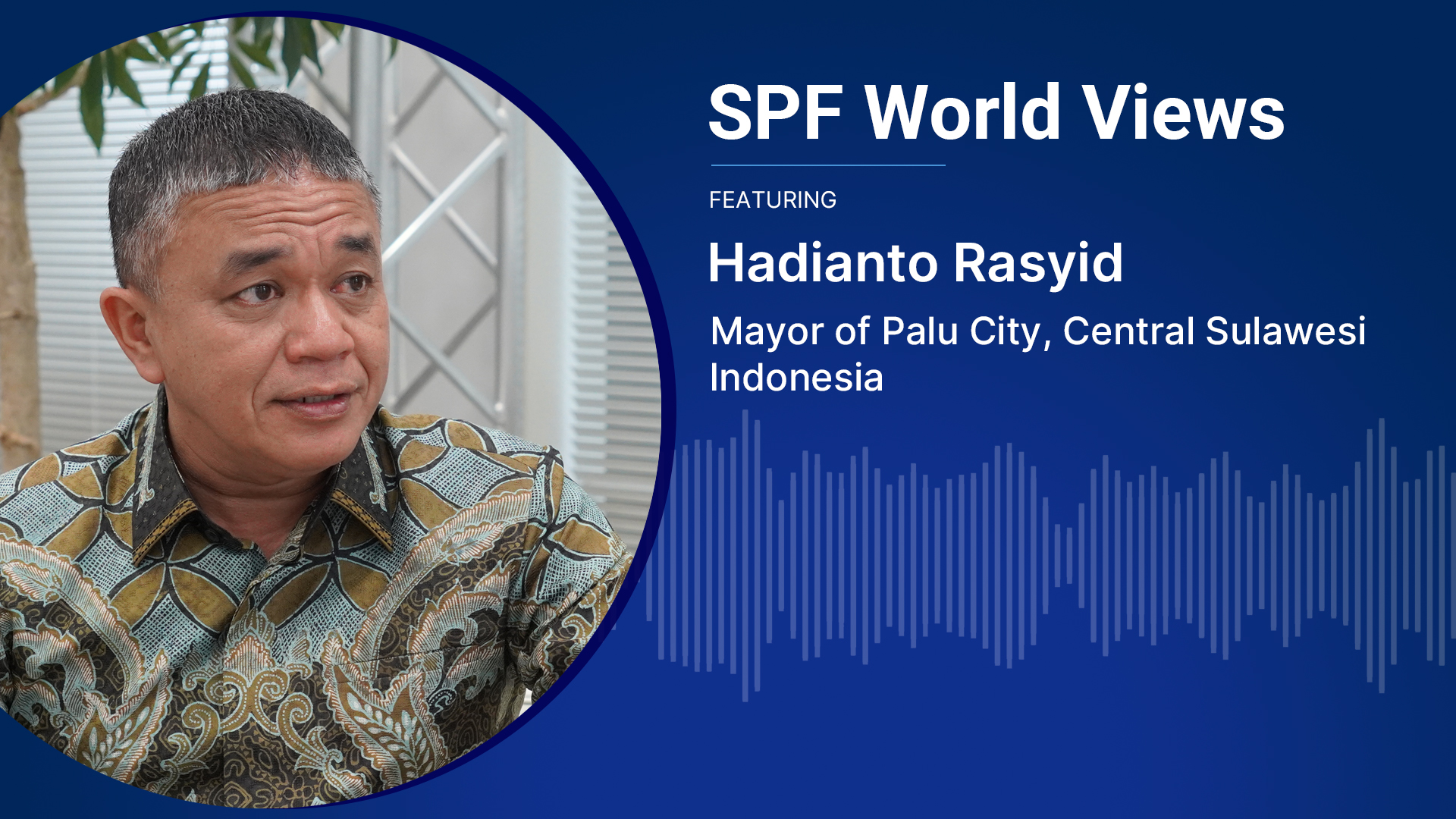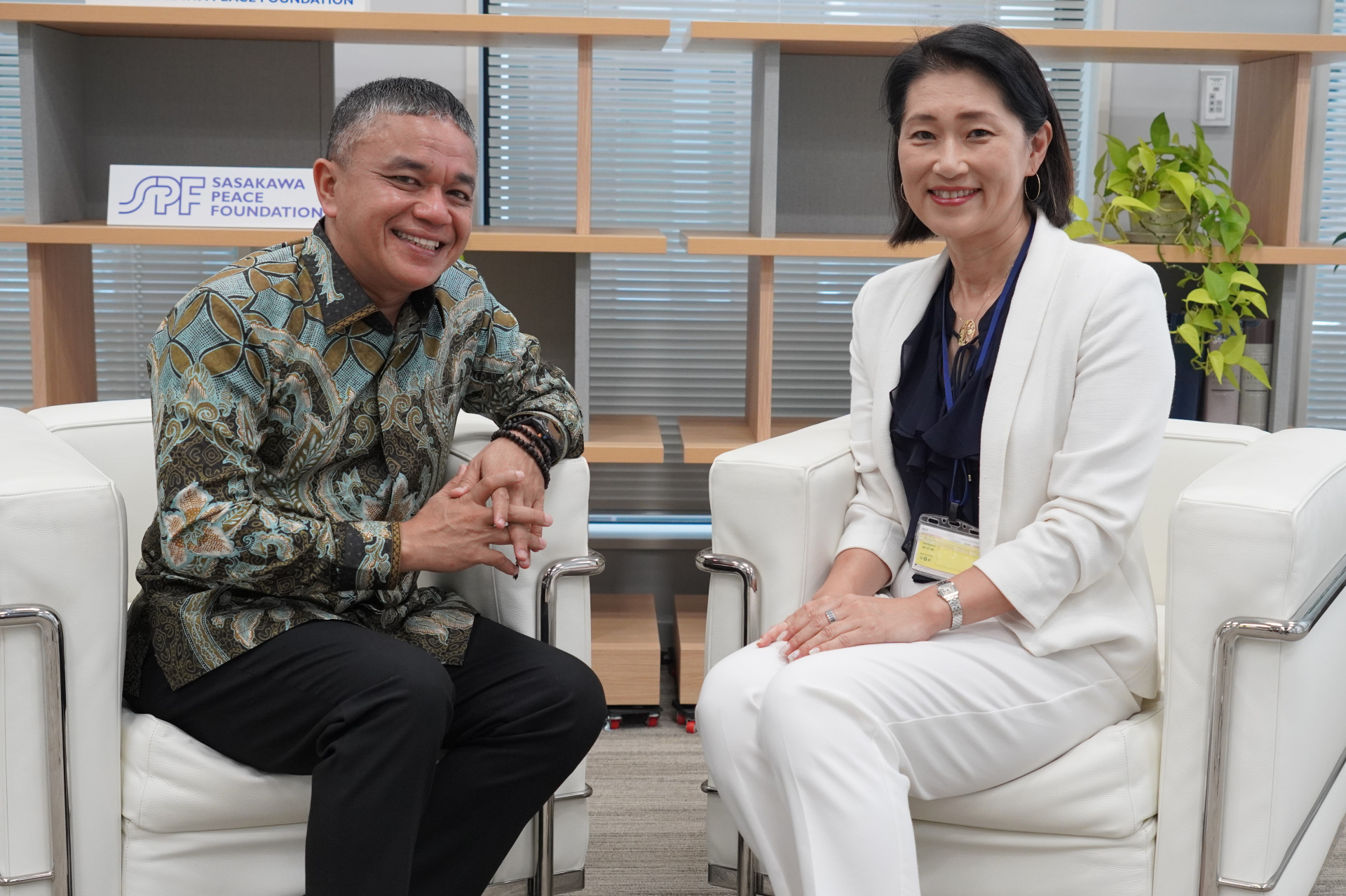Our guest today is Hadianto Rasyid, Mayor of Palu City, located in the province of Central Sulawesi in eastern Indonesia. In 2018, Central Sulawesi was hit by a triple disaster: a magnitude 7.5 earthquake followed by a tsunami and mudslides caused by liquefaction that devastated Palu City and the wider region. In this episode, Ayaka Matsuno, director of the Social Innovation Program at SPF, speaks with Mayor Rasyid about the city’s emergence from this triple disaster, his strategy to use social media to jumpstart dialogue between the government and the local community, and his vision for a more inclusive Palu City.
Welcome to the Sasakawa Peace Foundation. I'm very honored to have you here.
Mayor Rasyid: Me too. It's a great honor for me to be here with you.
You're the mayor of Palu city, which is located to Central Sulawesi. Central Sulawesi unfortunately had three disasters all together.
Mayor Rasyid: Yes, we call it a triple disaster. We got the earthquake, followed by a tsunami, landslide, and then liquefaction. So, it was very awful for us. So many people died and what was affected by the earthquake was not just the people, but all the things in Palu, the infrastructure, everything. That makes this a great devastation in Palu.
At that time, you were not the mayor yet, but after that you became a civil servant and then tried to really recover Palu together with your vision.
Mayor Rasyid: In that situation, all the people in Palu hand-to-hand faced the disaster. How to give help to the people and how to support the people to get up after facing the terrible disaster -- someone must do that. The disaster or even the worst thing that happened to us, we cannot despair. We have to fight for that.
So you took the challenge and became the mayor, and you came up with this concept of Palu Mantap Bergerak, or bring Palu together, and let’s go Palu! And then in that vision, you put the emphasis on inclusivity to include everybody. So “city for all” is your slogan, right?
Mayor Rasyid: Yes. City for all. Many people ask me how the government is present among the people, among the society. So I thought, the government need to hear what the people needs, what the people want, actually, and how to get the people together with the government to make a planning for the environment, for the city, how to make the cities more related to each other. I think that people should be put together with the government to make the program, like what we say, an inclusive program.
I heard that they you utilize SNS to really keep in touch with the people in Palu. Your followers on Instagram is 67,000 or more.
Mayor Rasyid: Around that.
Wow. How do you bring their voices to you?
Mayor Rasyid: Social media is very important at this time because with the social media, we can communicate with the people not just in Palu, but around the world. With the social media that I can show to the people and I can get the information from the people about everything that they want to share with me. So that's very helpful for me to know what it is the people need so I can respond to the need as soon as I can.
And then you have come up with some policies as well to really include people with disabilities and supporting entrepreneurship.
Mayor Rasyid: We have a program that we call Musrenbang Inklusi. Musrenbang is the meeting to ask the people to sit together, like a participatory meeting. We ask them to join together and we discuss many things about what the people need, about what the people want, and we can have information for them. How it should be, and how we can do these things. After that, we make a summary and we put in in a government program planning, and financing it, and how to make it so those things can run in the future.
The Musrenbang Inklusi is a program that together with the family from disabilities and communities, women and the youth, we are planning together to make what they want fulfilled by the government. That's very important.
So anybody can come up with these questions?
Mayor Rasyid: Yes, from all the layers of people in Palu. The Musrenbang is held from below, from the rural to district and finally we finalize it in the city. That’s very important, like I told you just now, the government needs to be felt by the people, so we must put all the people, all the society together with the government to make a planning for the programs.
I heard that you won second place for inclusive policy for local development.
Mayor Rasyid: Yes, we got second in Indonesia for that.
That's wonderful. So that kind of effort is bringing the attention from our side as well. We thought that your city, although you had a really difficult triple disaster, but then tried to come out with more inclusivity in mind, also sustainability in mind. So, the Sasakawa Peace Foundation starting from last year, we worked together with the City of Palu and then also gathered some information to try to really capture the essence of solidarity. We understood that because of this disaster, people in Palu are even more united and solid.
And then, you have the local wisdom nosarara nosabatutu, so we wanted to really tap into the resources to really create a society where people can really be united and then come through this difficult time together and then have sustainable economic growth. That's the concept that we wanted to really work together with you.
How have you been working with the Sasakawa Peace Foundation? Can you elaborate a little bit?
Mayor Rasyid: When the Sasakawa Peace Foundation came with the concept of social solidarity economy and made a preliminary visit for that in Palu, like you say, the concept of nosarara nosabatutu that Palu city has, right? So, nosarara nosabatutu means that we are brother and sister, so we are united. If we want to make a fast move from every situation, from any circumstances, we have to stand together for that.
And the Sasakawa Peace Foundation brings that concept that is aligned with our concept of nosarara nosabatutu and we believe that cooperating with the Sasakawa Peace Foundation can make everything move faster, especially how to boost the economy of the people from disabilities, from women, especially women and the children.
We agreed to make a good cooperation with the Sasakawa Peace Foundation in the future to fulfill everything, to make a good cooperation for everything, and to make everything get better in the future.

